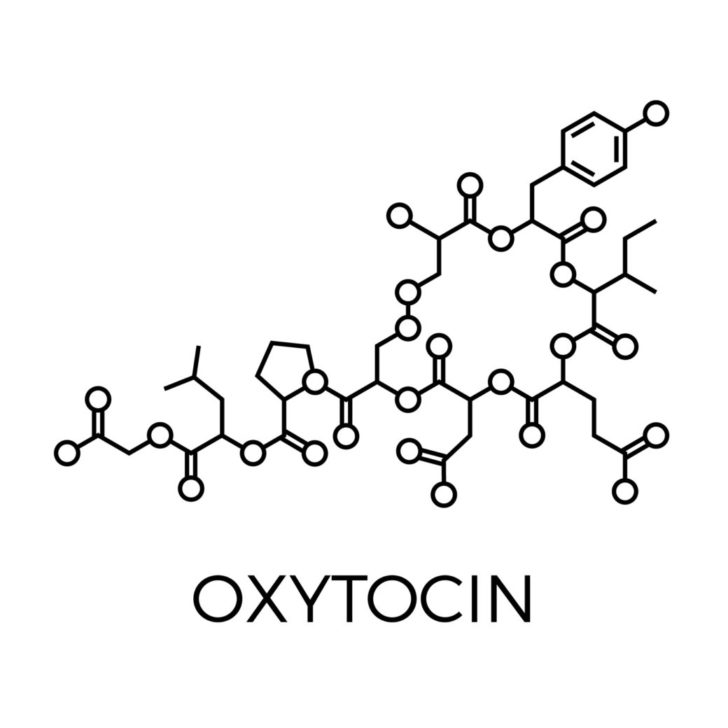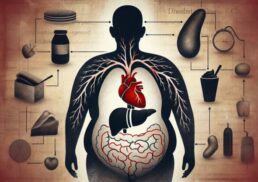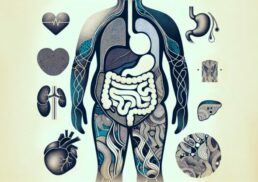Imagine a hormone that plays a crucial role in childbirth, breastfeeding, bonding, stress reduction, and even sexual pleasure. The hormone oxytocin, often referred to as the “love hormone,” is that very hormone. Its effects on human behavior and emotions have fascinated scientists for decades. In this blog post, we’ll explore the origin, functions, and effects of oxytocin, diving into the complex world of this powerful hormone and its wide-ranging influence on our lives.
From its production in the hypothalamus to its release by the pituitary gland, the hormone oxytocin is a vital player in reproductive and social behaviors. We’ll also uncover the locations of oxytocin receptors throughout the body and brain, their impact on various physiological and behavioral responses, and the medical applications of synthetic oxytocin. Prepare to unravel the mysteries surrounding this remarkable hormone and its far-reaching effects on human life.
Table of Contents
Short Summary
Oxytocin is a hormone and neurotransmitter with primary functions in labor/childbirth, lactation, and emotion/social behavior.
Oxytocin receptors are found throughout the body & brain to influence physiological & behavioral responses involved in social behaviors and relationships.
Variations of the oxytocin receptor gene have implications for social behavior, stress susceptibility, health conditions. Offering potential therapeutic insights into its far reaching effects.
Understanding Oxytocin: The Hormone’s Origin and Purpose

Oxytocin is a hormone and neurotransmitter produced in the hypothalamus and released by the pituitary gland. Often dubbed the “love hormone,” “cuddle hormone,” or “bonding hormone,” it plays a vital role in reproductive and social behaviors. The name oxytocin itself is derived from the Greek words “oox,” meaning “swift birth,” coined by Sir Henry Dale.
Notably, Vincent du Vigneaud sequenced and synthesized oxytocin, earning him the Nobel Prize in 1955. The hormone’s two primary physical functions are inducing uterine contractions during labor and childbirth, and inducing contractions of breast tissue for lactation after childbirth.
Oxytocin also acts on the brain and spinal cord, influencing emotions and social behaviors such as empathy, trust, and the establishment of relationships.
Production and Release
The hypothalamus is responsible for producing oxytocin, while the human posterior pituitary gland stores and releases the hormone in response to various stimuli. Oxytocin release is crucial for functions such as childbirth, breastfeeding, and even stress reduction. Intranasal oxytocin, administered as an oxytocin nasal spray, is a method used in research to study the effects of oxytocin on human behavior and emotions.
Oxytocin’s role in stress and social behavior is particularly intriguing. The hormone has been found to:
Modulate stress responses in the neuroendocrine, autonomic nervous, and immune systems.
Regulate cortisol levels, the stress hormone, thus reducing stress.
Promote human social interactions.
Be considered an anti-stress hormone.
Primary Functions
As mentioned earlier, oxytocin’s primary functions include stimulating uterine contractions and milk let-down. Oxytocin plays an important role during labor by increasing uterine motility. This in turn results in contractions of the uterus muscles. The release of oxytocin during labor facilitates the widening of the cervix and vagina, with subsequent contractions further increasing this widening. In the context of breastfeeding, a baby attaching to its mother’s breast instigates the release of oxytocin, which in turn stimulates contractions of the myoepithelial cells in the alveolar ducts of the breasts, promoting milk let-down.
In addition to these primary functions, oxytocin also serves as a chemical messenger in the brain for social interactions. This role is particularly significant as it influences various aspects of social behavior, including trust, empathy, and bonding. Research has shown that oxytocin promotes human ethnocentrism, increasing in-group favoritism and out-group derogation. Understanding these functions further highlights the hormone’s far-reaching impact on human life.
Oxytocin Receptors and Responses
Oxytocin receptors are found throughout the body and brain, influencing a variety of physiological and behavioral responses. These receptors are G protein-coupled receptors that are known to be coupled to phospholipase C-beta via G(q) proteins and are believed to play a role in modulating human social behaviors and relationships, including cognition. Oxytocin receptors have been identified in uterine smooth muscle, myoepithelial cells in the mammary gland, and in the pituitary.
The implications of oxytocin receptors are still being studied; however, it is believed that they may be involved in the modulation of human social behaviors and relationships, including cognition. Responses to varying levels of oxytocin include uterine contractions, milk ejection, and increased trust and bonding in social situations.
As researchers continue to explore the diverse effects of oxytocin receptors, we gain a deeper understanding of the hormone’s influence on various aspects of human life.
Location of Oxytocin Receptors
Oxytocin receptors are located in various regions of the body, including the uterus, mammary glands, and brain regions associated with social behavior and emotions. In the uterus, oxytocin receptors play a critical role in inducing contractions during labor and childbirth. In the mammary glands, these receptors facilitate lactation by stimulating contractions of the myoepithelial cells in the alveolar ducts.
In the brain, oxytocin receptors are found in regions associated with social behavior and emotions, such as the hippocampus, pons, and substantia nigra. These receptors are implicated in the regulation of social behavior and emotions, further emphasizing the hormone’s far-reaching impact on human life.
Oxytocin Responses
As previously mentioned, oxytocin elicits a range of responses, including uterine contractions during labor and milk ejection during breastfeeding. In addition to these physical responses, oxytocin also influences social bonding, sexual pleasure, and stress reduction. Oxytocin has been found to be involved in the regulation of stress responses, the promotion of social bonding, and the influencing of human ethnocentrism. Monitoring oxytocin levels can provide valuable insights into these various physiological and psychological processes.
Synthetic oxytocin is utilized in medical settings to initiate uterine contractions during childbirth and for other medical purposes, including the treatment of postpartum depression. Oxytocin’s role in human sexual activity is also significant, as it is implicated in sexual arousal and the brain reward system responses that accompany sexual activity.
The Role of Oxytocin in Stress and Social Behavior
Oxytocin’s influence on stress and social behavior is multifaceted. The hormone is known to be effective in lessening stress responses, such as anxiety. This stress-reducing effect is thought to be linked to oxytocin’s ability to regulate cortisol levels, the stress hormone.
In terms of social behavior, oxytocin has been demonstrated to:
Promote human social interactions
Increase trust and empathy
Enhance bonding between individuals
Reduce social anxiety
Oxytocin may be considered an anti-stress hormone.
Research has also linked oxytocin to human ethnocentrism, promoting in-group trust and cooperation while increasing out-group suspicion. The ramifications of oxytocin’s influence on human ethnocentrism are considerable, as it can promote increased social unity within a group while also prompting increased prejudice and discrimination against out-groups.
Oxytocin and Cortisol
The relationship between oxytocin and the stress hormone cortisol is complex. While cortisol is recognized as being implicated in energy mobilization during stress, oxytocin has been demonstrated to possess anti-inflammatory, anxiolytic, and analgesic effects. Oxytocin can modulate stress responses, such as cortisol reactivity, potentially reducing stress and promoting relaxation.
The potential implications of oxytocin’s stress-reducing effects are vast. As oxytocin can reduce cortisol levels, it may help alleviate stress and promote relaxation in various aspects of human life, from childbirth to social interactions. Further research on oxytocin’s interaction with cortisol may unlock new therapeutic possibilities for stress-related conditions.
Oxytocin and Human Ethnocentrism
Oxytocin may influence human ethnocentrism, promoting in-group trust and cooperation while increasing out-group suspicion. Research has demonstrated that oxytocin increases trust and cooperation within a group, thereby resulting in increased in-group favoritism. On the other hand, oxytocin can lead to a heightened sense of suspicion and distrust towards out-groups, resulting in out-group derogation.
The potential consequences of oxytocin’s influence on ethnocentrism are significant. While promoting increased social unity within a group, oxytocin may also prompt increased prejudice and discrimination against out-groups. Understanding these effects furthers our understanding of the complex role oxytocin plays in human social behavior.
Medical Applications of Synthetic Oxytocin
Synthetic oxytocin has various medical applications, from inducing labor and augmenting uterine contractions during childbirth to treating certain health conditions like postpartum depression.
As our understanding of oxytocin’s functions and effects continues to grow, so do the potential medical applications of this powerful hormone.
Stimulating Uterine Contractions
Synthetic oxytocin is used to stimulate uterine contractions, induce labor, strengthen contractions, and control postpartum bleeding. Oxytocin elicits the uterine muscles to contract and augments the production of prostaglandins, which further intensify contractions. These effects are critical in initiating and maintaining the process of labor and childbirth.
However, there are potential side effects of oxytocin use during childbirth. Rapid heartbeat and unusual bleeding have been noted, and if an excessive amount of oxytocin is administered quickly, it could result in a rupture of the uterus. It is essential to carefully monitor oxytocin usage during labor to ensure the safety of both the mother and the baby.
Other Medical Uses
Beyond its role in childbirth, synthetic oxytocin has potential applications in treating social disorders, male infertility, and promoting bone formation. Some researchers are focusing their efforts on developing oxytocin-based medications as a promising treatment for altered nociception. This could be a major advancement in therapy.
Oxytocin is also speculated to be involved in the management of male infertility. The potential for oxytocin in medical applications is vast, and further research may unlock new ways to utilize this hormone in the treatment of various health conditions. As our understanding of oxytocin’s functions and effects continues to grow, so does the potential for its use in the medical field.
Oxytocin’s Influence on Human Sexual Activity
Oxytocin’s influence on human sexual activity is significant, affecting arousal and the brain’s reward system. The hormone is involved in sexual arousal, increasing blood flow and sensitivity in genital regions. Furthermore, it plays a role in the brain reward system responses that accompany sexual activity, promoting feelings of pleasure and satisfaction.
For individuals assigned male at birth, oxytocin contributes to ejaculation and influences the production of testosterone in the testes. The hormone’s effects on sexual activity and pleasure highlight its far-reaching impact on various aspects of human life, from childbirth and breastfeeding to social bonding and sexual pleasure.
Sexual Arousal
Oxytocin plays a role in sexual arousal, increasing blood flow and sensitivity in genital regions. By facilitating penile erection and sexual activity, oxytocin has been found to influence various aspects of sexual pleasure and satisfaction. The hormone is commonly referred to as the “love hormone” due to its association with increased bonding, sexual receptiveness, and intimacy.
This influence of oxytocin on sexual arousal showcases the hormone’s highly versatile role in human life. By enhancing sexual pleasure and satisfaction, oxytocin contributes to the overall quality of life and well-being of individuals.
For more info, visit Love hormone oxytocin linked to hypersexuality.
Brain Reward System Responses
Oxytocin has been observed to modulate reward-related behaviors and reinforce partner value, interacting with the brain reward system to promote bonding and affiliative behavior. The nucleus accumbens shell, a brain region implicated in reward, plays a crucial role in this process, with centrally projecting oxytocin neurons contributing to these effects.
The hormone’s influence on the brain reward system underscores its far-reaching impact on human behavior and emotions. As oxytocin continues to shape our understanding of social bonding, sexual pleasure, and stress reduction, its potential applications in the fields of mental health and well-being become increasingly apparent.
The Oxytocin Receptor Gene: Variations and Implications
Genetic variations in the oxytocin receptor gene (OXTR) can have implications for behavior and health. The OXTR gene encodes the protein that serves as the receptor for oxytocin and is part of the G-protein coupled receptor family, playing a role in various physiological and behavioral processes such as social bonding, empathy, and stress response.
These genetic variations may be linked to differences in social behavior, susceptibility to stress, and risk for certain health conditions. Understanding the genetic basis of oxytocin’s effects broadens our understanding of the hormone’s diverse influences and may provide insights into novel therapeutic approaches for various health conditions.
Genetic Variations
Variations in the oxytocin receptor gene can affect an individual’s sensitivity to the hormone and its effects. These genetic variations have been linked to a variety of conditions and traits, such as:
Polycystic ovarian syndrome
Autism spectrum disorder
Trust behavior
Social behavior
Moral judgment
By understanding how these variations may affect an individual’s sensitivity to oxytocin and its effects, we can better comprehend the hormone’s far-reaching impact on human life. This knowledge may offer insights into the development of targeted treatments and therapies for various conditions related to oxytocin function.
Implications for Behavior and Health
Genetic variations in the oxytocin receptor gene may be associated with disparities in social behavior, including heightened empathy and trust. Furthermore, these variations may be linked to disparities in susceptibility to stress, including increased resilience to stress.
The potential consequences of these genetic variations for individuals and society are significant. As our understanding of the genetic basis of oxytocin’s effects continues to grow, we may uncover new possibilities for targeted treatments and therapies to address a range of health conditions and behavioral challenges related to oxytocin function.
Summary
Throughout this blog post, we have unraveled the mysteries surrounding oxytocin, exploring its origin, functions, and effects on human life. From childbirth and breastfeeding to social bonding and sexual pleasure, oxytocin’s versatile role in human behavior and emotions is truly remarkable. We also delved into the medical applications of synthetic oxytocin, the influence of genetic variations in the oxytocin receptor gene on behavior and health, and the hormone’s impact on stress and social behavior.
As we continue to expand our understanding of oxytocin’s far-reaching influence, we unlock new possibilities for therapeutic advancements and improved quality of life. The “love hormone” may hold the key to unlocking a deeper understanding of human behavior and emotions, and its potential applications in the fields of mental health and well-being are boundless.
Frequently Asked Questions
What does the hormone oxytocin do?
Oxytocin is a hormone that facilitates childbirth by stimulating the uterine muscles to contract, and increases production of prostaglandins, which further increase the contractions.
Prostaglandins are hormones that are released during labor and help to increase the intensity and frequency of contractions. They also help to soften and thin the cervix, which helps the baby to pass through the birth canal more easily. Oxytocin also works.
What triggers the release of oxytocin?
Oxytocin is released in response to various forms of physical contact and bonding, such as skin-to-skin contact, sexual activity, stroking, warm temperature, and massage-like hand movements.
Labor and breastfeeding can also trigger the release of oxytocin.
How does oxytocin make you feel?
Oxytocin is known to trigger feelings of love, protection and connection, as well as reduce stress and anxiety. It also has the power to regulate emotional responses and pro-social behaviours such as trust, empathy and positive communication.
Why is oxytocin the love drug?
Oxytocin has earned the nicknames “love hormone” and “cuddle hormone” because of its association with trust, sexual arousal, relationship building, hugging and orgasm.
It’s also involved in mother-infant bonding during childbirth and helps foster a bond between partners when they fall in love.
What is oxytocin’s role in childbirth and breastfeeding?
Oxytocin plays an essential role in childbirth and breastfeeding, stimulating uterine contractions during labor and inducing contractions of breast tissue for lactation.









